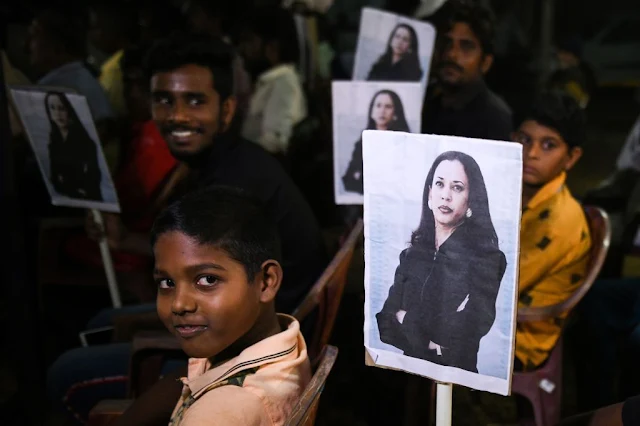The picture for the US presidential election is becoming clearer now. After President Joe Biden announced his withdrawal from the race, former President Barack Obama and his wife Michelle Obama immediately endorsed Kamala Harris. Barack Obama made this announcement through a video. In it, Barack Obama said that he and Michelle are proud to support Kamala Harris.
Meanwhile, former US President and Republican presidential candidate Donald Trump stated that Vice President Kamala Harris is not fit to rule the country. After Biden's withdrawal, Harris (59) is now the potential Democratic candidate, and she will be officially declared as the party's presidential candidate at the Democratic National Convention in August. Trump said, 'Kamala Harris is the most liberal elected politician in American history. If she ever comes to power, she will destroy this country. We will not let this happen.'
Kamala Harris has also announced her intention to debate with Donald Trump on TV.
In the world's most powerful democracy, the US, it seems that Vice President Kamala Harris is trying her luck in the presidential election to be held at the end of the year. Until now, Joe Biden, who was a strong contender for the Democratic party's presidential candidate, has distanced himself from the race. Biden took this step as pressure increased to withdraw due to his advancing age.
After falling behind in a TV debate against Republican candidate and former President Donald Trump, it appeared that Trump was a strong contender compared to the elderly Biden. However, with Kamala Harris emerging as the Democratic candidate, the situation has changed. Now, Trump has become the oldest candidate in Biden's place.
The most important aspect is that the current President Joe Biden has endorsed Vice President Kamala Harris's candidacy, making this election even more competitive. Kamala Harris is the first African-American female presidential candidate in US history. For Democrats, this is a risk they will have to take. In reality, Trump is a strong supporter of white supremacy in America.
By choosing Kamala Harris for the vice-presidency, Biden also took a similar risk. However, gradually, Democrats in America are openly coming out in support of Kamala Harris. Nevertheless, Kamala's candidacy will be finalized at the Democrats' national convention in Chicago next month. Kamala's positive side is that she holds the second constitutional position after Biden.
Naturally, Democrats can hardly deny the candidacy of a female and African-American candidate. However, Kamala will also have to endure some criticism for her failures during her vice-presidency, particularly on the issue of illegal immigrants. However, she has been successful on the issue of abortion rights. Now, Kamala's candidacy has increased the challenges for Trump.
However, ambitious Democrats may challenge Kamala's candidacy. Currently, Kamala Harris's entry has made the US presidential election very interesting. To oppose the Democrats, Republicans will have to come up with new issues.
In reality, Kamala, the eldest daughter of an Indian-origin mother and Jamaican-origin father Donald Harris, is seen as Indian. However, it is difficult to say how emotional or political her connection to India and Indian culture is. A section of Indians in America believes that she is more active on the issues of the African-American community than on those of Indians.
However, among Indians, she emphasizes her Indian heritage. During the vice-presidential election, she also mentioned her past and experiences related to her maternal home in Tamil Nadu to attract Indians. There is no doubt that Kamala is a multifaceted personality politician. This is why when Kamala Harris was chosen for the vice-presidency, Biden said that he was preparing new leadership for the country. Today, with her candidacy for the presidency, that moment seems to have arrived.
It is noteworthy that her mother Shyamala Gopalan, born in Chennai, dared to go to America when it was considered extremely difficult to allow a single daughter to study abroad. After graduating from Delhi University, she went to America in 1958 to pursue a PhD in nutrition and endocrinology.
She later became a researcher in the field of breast cancer. While fighting for human rights at Berkeley, Shyamala came in contact with and married Donald Harris. Later, after divorcing Harris, Shyamala raised Kamala and her sister Maya with Indian values.
Although Kamala is a prominent African-American leader in America today, she has never denied her connection to India. Born in Oakland, California, Kamala studied at Harvard University.
After earning a law degree from the University of California, she began practicing law. In 2014, she married Jewish lawyer Douglas Emhoff according to Jewish and Indian traditions. However, she has built an image as an African-American politician. Given the decisive votes of Indian and African-American people in America, Biden supported Kamala's presidential candidacy.
Today, Kamala Harris's image in America is that of a liberal, modern values-promoting, and human rights-fighting woman. Undoubtedly, Kamala Harris is a clear speaker and charismatic leader. Despite this, most of the 4 million Indian Americans settled in the US believe that her presidency will elevate India's status, although some think that her perspective on issues like Kashmir is not very positive.
Whether Kamala Harris becomes the first female President of the United States will be determined in the coming time.



Comments